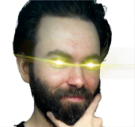Sidis Coruscatis
Community Member
- MBTI
- INTJ
- Enneagram
- 964
I have a clarification. Does this emoji mean you're angry?So rocks can be happy now?
View attachment 81554
Also I guess this is a good time to tell you that your meme-moji is being superseded. I think I really improved on the concept with this one.
So rocks can be happy now?
View attachment 81554
Also I guess this is a good time to tell you that your meme-moji is being superseded. I think I really improved on the concept with this one.
I'm INTJ, I'm always angry. But no.I have a clarification. Does this emoji mean you're angry?
Lmao is this you?!
Yeah, it’s exceptional. But you gotta use it repeatedly, ad infinitum, in other to harness its true potential

I'm INTJ, I'm always angry. But no.
Yeah, it took grueling 2 hours learning how to mask background in GIMP but it was worth everything. There's also the rare Approving Sid, but no one may ever see it after this again.
View attachment 81555
Applause and pat on the back for the effort. Again and again and again. We have to pay you for those two hours.I'm INTJ, I'm always angry. But no.
Yeah, it took grueling 2 hours learning how to mask background in GIMP but it was worth everything. There's also the rare Approving Sid, but no one may ever see it after this again.
View attachment 81555
You’ve no idea how happy it makes me that you went so far as to take 2 hours to make those.
Applause and pat on the back for the effort. Again and again and again. We have to pay you for those two hours.
Vanity!!!!Okay, relax. It's not like I had anything better to do lol.
The Holy Trinity has assembled
Fine, pay me then, see if I careVanity!!!!

Just want to mention that I wrote a paper on free will.
https://www.infjs.com/xfa-blog-entry/free-will.8052/
I read your entry. If I understand your argument correctly, you argue that free will (as generally understood) is a fallacy, because choice at any moment t is always a function of 1) circumstances and 2) moral constitution. In other words, choice is not really free, because it is always determined by a combination of circumstances and moral being (in the sense of one's moral constitution).
The weakness I see in this argument is that it assumes the truth of what it is seeking to demonstrate. I don't have an issue with the circumstances part of the equation, but it seems to me that the moral being part is problematic. You are assuming, from the start, that some people are essentially morally better than others. In other words, that some people are born 'morally good' and others not. Therefore the moral constitution of a person, in this interpretation, is not defined by their actions: rather, it is the constitution that determines the actions.
What this implies is that you already operate with a definition of moral constitution that excludes free will, prior to arriving at the conclusion that free will does not exist. Your deduction is something like this:
circumstances x moral constitution (excluding free will) → choice (excluding free will)
Of course free will is going to be excluded, since its exclusion is presupposed in the definition of moral being. There is a circularity here, which can be seen from the fact that the exclusion of free will is on both sides of the arrow.
As an aside, I think this view has problematic consequences as well. In this interpretation, moral improvement is impossible, because moral constitution is posited as an essence and therefore as a constant. I suppose this is compatible with the theory of predestination, and reflects the views of St. Augustine and Calvin. I am not rationally compelled by it, however.
I have a lot of thoughts on this, but I've been trying to structure them into Te organization in order to better communicate them. I will answer this when I'm done pulling my thoughts out lol. It sounds more painful than it is.I was inspired by @Anomaly's thread on Interpersonal questions to introduce a new philosophical problem that may be of interest.
What is the nature of pain? Is it physiological? Is it mental/psychological? Is it both?
Would we experience pain in the same way if we didn't have a mind?
